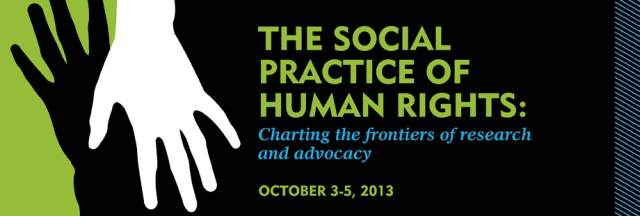Paper/Proposal Title
Arab Human Rights NGOs: Towards an Arab Spring
Location
River Campus - Room M2060
Start Date
10-4-2013 3:15 PM
Abstract
In a transitional period similar to the one that the Arab world is going through, the importance of Human Rights and the role of the Civil Society get extreme relevance. At a time when every establishment of the government has been shaken, non-governmental organizations need to present alternative views and approaches that serve as a compass pointing toward common principles that can join people together and form the bases of the new state building process. For human right to be viewed as such a common bases, human rights NGOs are facing the challenge of advocating for it and making it relevant to a wide public severely divided on values, approaches and ideologies. The debate about the universality or relativity of human rights that was thought to be overcome, emerges again as challenge for human rights advocates in the post-revolution Arab world. Is there any space for adaptation or translation of human rights without losing the essence of universality? Would that facilitate or hinder human right advocacy? What kind of challenges will it present? Will that raise the chances of the adoption of human rights as a common ground for future state building and a real Arab Spring?
Arab Human Rights NGOs: Towards an Arab Spring
River Campus - Room M2060
In a transitional period similar to the one that the Arab world is going through, the importance of Human Rights and the role of the Civil Society get extreme relevance. At a time when every establishment of the government has been shaken, non-governmental organizations need to present alternative views and approaches that serve as a compass pointing toward common principles that can join people together and form the bases of the new state building process. For human right to be viewed as such a common bases, human rights NGOs are facing the challenge of advocating for it and making it relevant to a wide public severely divided on values, approaches and ideologies. The debate about the universality or relativity of human rights that was thought to be overcome, emerges again as challenge for human rights advocates in the post-revolution Arab world. Is there any space for adaptation or translation of human rights without losing the essence of universality? Would that facilitate or hinder human right advocacy? What kind of challenges will it present? Will that raise the chances of the adoption of human rights as a common ground for future state building and a real Arab Spring?




Comments
This biennial conference provides a unique space for scholars, practitioners and advocates to engage in collaboration, dialogue and critical analysis of human rights advocacy — locally and globally. Learn more about the Human Rights Center at the University of Dayton >>>.